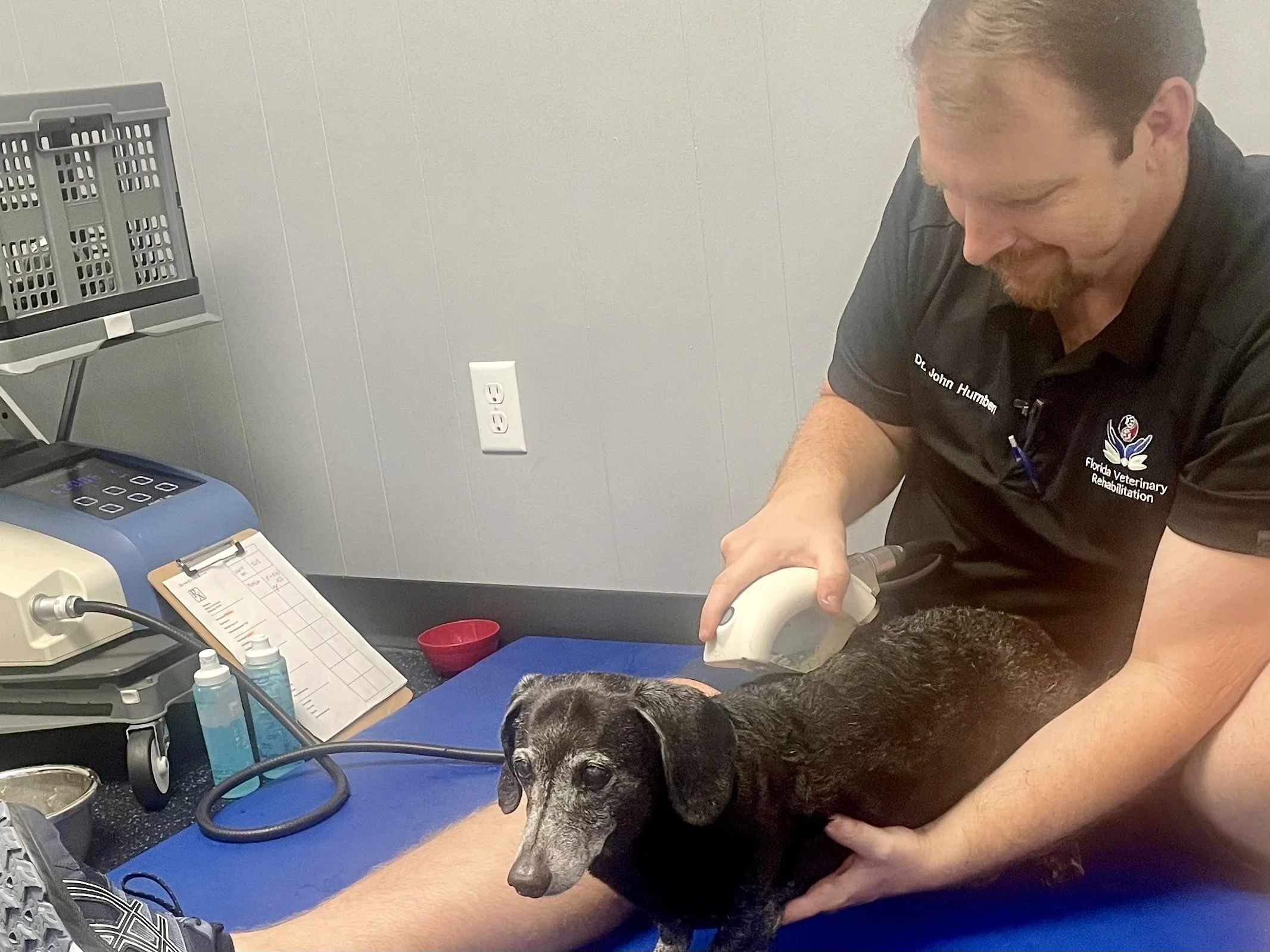Shockwave Therapy
Extracorporeal shockwave therapy (ESWT) is a cutting-edge, non-invasive treatment that harnesses high-energy sound waves to kickstart healing in pets. Shockwave therapy stimulates the body’s natural restorative processes to decrease inflammation, alleviate pain, and repair damaged nerves and tendons.
Shockwave therapy is a safe, effective way to get pets back to peak performance. Treatments are completely customizable and painless. At FVR we use the PiezoWave2 therapy device which does not require sedation.
The sound waves emit targeted pressure pulses deep into tissues to increase blood flow and cellular regeneration. Focused shockwave treatments can address multiple orthopedic, neurologic, and musculoskeletal conditions including:
Tendon/ligament injuries
Osteoarthritis
Intervertebral disc disease (IVDD) and back pain
Myofascial trigger points
Post-surgical recovery
Chronic pain
Lumbosacral stenosis
Non-healing wounds
Shockwave FAQs
-
Shockwave therapy is a non-invasive treatment that involves the application of high-energy sound waves to the affected area. These acoustic waves stimulate blood circulation, increase cellular activity, and trigger the body's natural healing response. As a result, shockwave therapy promotes tissue repair, reduces inflammation, and provides pain relief for various musculoskeletal conditions in pets. This non-invasive treatment has proven to be safe and effective, helping our furry companions recover and regain their mobility and comfort.
-
Shockwave therapy is a versatile and beneficial treatment that can address a range of musculoskeletal conditions in animals. Some of the medical and lay terms for these conditions include:
Arthritis (Osteoarthritis): A degenerative joint disease that causes pain, inflammation, and reduced mobility.
Tendonitis/Tendinopathies: Inflammation or irritation of a tendon, commonly known as "tendinitis."
Ligament Injuries: Damage to the tough bands of connective tissue that stabilize joints, often referred to as "sprains" or "ligament tears."
Muscle Strains: Overstretching or tearing of muscle fibers, sometimes known as "pulled muscles."
Joint Pain (DJD - Degenerative Joint Disease): Chronic pain and deterioration of joint cartilage, leading to stiffness and discomfort.
Bursitis: Inflammation of fluid-filled sacs (bursae) that cushion and lubricate joints, causing pain and swelling.
Hip Dysplasia: A developmental condition where the hip joint doesn't fit properly, leading to pain and reduced mobility.
Patellar Tendonitis (Jumper's Knee): Inflammation of the patellar tendon in the knee, common in active dogs.
Stress Fractures: Small cracks in bones due to repetitive impact, seen in high-performance animals.
Shockwave therapy has shown promising results in alleviating pain, reducing inflammation, and promoting tissue healing for these and other musculoskeletal conditions in animals. By targeting the affected areas with high-energy sound waves, this non-invasive treatment supports the overall well-being and performance of our beloved pets, ensuring they can lead active and comfortable lives.
-
Yes, shockwave therapy is safe when administered by trained professionals. Florida Veterinary Rehabilitation utilizes state-of-the-art equipment and protocols to ensure the safety and comfort of your pets during treatment.
-
Not at all. The shockwave therapy we offer at FVR utilizes the PiezoWave2 therapy device, which is non-invasive and typically well-tolerated by animals. Sedation is not required. Our expert team ensures that the treatment is comfortable and stress-free for your pets, allowing them to experience the full benefits of shockwave therapy without the need for anesthesia or sedation.
-
Some pets may experience immediate improvement, while others may see gradual progress over several days to weeks after treatment.
-
The number of sessions required varies depending on your pet's condition and response to treatment. Typically, a series of 3-5 sessions is recommended for optimal results.
-
Many pet insurance providers now offer coverage for shockwave therapy as part of their rehabilitation or alternative therapy packages. We recommend checking with your insurance provider for specific coverage details.

